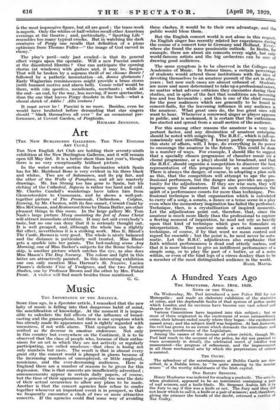Music
THE IMPORTANCE OF THE AMATEUR.
SOME time ago, in a Spectator article, I remarked that the new laity of music is falling into that dangerous habit of mind, the sanctification of knowledge. At the moment it is impos- sible to calculate the full effects of the influence of broad- casting and the gramophone, but there is one symptom which has already made its appearance and is rightly regarded with uneasiness, if not with alarm. That symptom can be de- scribed as the decrease in amateur endeavour. Not only in this country but everywhere on the Continent, it is to be observed that the class of people who, because of their enthu- siasm for an art in which they are not actively or regularly participating, are called amateurs—that class is losing not only numbers but caste. The result is that in almost every great city the concert world is plunged in gloom because of the increasing numbers of unemployed, or little employed, musicians, and the ever-decreasing audiences. Here in England there are a number of reasons to be given for this depression. One is that concerts are insufficiently advertised ; announcements appear in certain daily papers, of course, but the time of their appearance is generally too near the date of their actual occurrence to allow any plans to be made. Another is that the concert agencies here refuse to confer together whenever an important event is in prospect, so that we frequently encounter a clash of two or more attractive concerts. If the agencies could find some way of avoiding these clashes, it would be to their own advantage, and the public would bless them.
But the English concert world is not alone in this respect. An English singer has recently related her experiences during the course of a concert tour in Germany and Holland. Every. where she found the same pessimistic outlook. In Berlin, for example, there are about six concerts every night, but only world-famous artists and the big orchestras can be sure of drawing good audiences.
The same symptom is to be observed in the Colleges and Academies of Music. In former times, a certain percentage of students would attend these institutions with the idea of devoting themselves to an amateur pursuit of the art in after. years ; but now such cases are almost unheard of. Students are more and more determined to take up a professional career, no matter what adverse criticism they encounter during their studies, and in spite of the fact that conditions are becoming less and less favourable ; and this is one of the chief reasons for the poor audiences which are generally to be found in concert-halls, for the leavening influence in any audience is the amateur. What great ones do, the less great ones will want to hear. Whenever a renowned singer or player appears in public, and is acclaimed, it is certain that the enthusiasm has started and spread from a small section of the audience.
For this among other reasons the amateur is a very im. portant factor, and any diminution of amateur enterprise should be noted with misgiving. The B.B.C., which is (all-un- consciously and unwillingly, I know) partly responsible for this state of affairs, will, I hope, do everything in its power to encourage the amateur in the future. This could be done in a number of ways. For example, I should like to suggest that a specially chosen programme of chamber-music (or a choral programme, or a play) should be broadcast, and that the B.B.C. should organize a competition to discover the best representation of this programme by an amateur society. There is always the danger, of course, in adopting a plan such as this, that the competitors will attempt to ape the pro-, fessional performers, but the danger also provides an oppor- tunity for the adjudicators. If they are wise men, they will impress upon the amateurs that in such circumstances the spirit of a performance counts for more than technique. Pro- fessional technique is that organization which is calculated to carry off a song, a sonata, a dance or a tense scene in a play even when the momentary inspiration has failed the performer. Technique, then, is a crystallization of inspired moments. Let the adjudicators point out, therefore, that, since the amateur is much more likely than the professional to capture a fleeting moment of inspiration, he need not rely so heavily upon that kind of technique which goes to formulate an interpretation. The amateur needs a certain amount of technique, of course, if by that word we mean control and regard for ensemble ; but the point is, he need never be auto- matic. Let the B.B.C. adjudicators also emphasize that faith without performances is dead and utterly useless, and that it is more blessed to gjve an indifferent performance of a simple song, or to play the part of butler, or of a noise within, or even of the hind legs of a circus donkey than to be a member of the most distinguished audience in the world.
BASIL MAINE.
























































 Previous page
Previous page